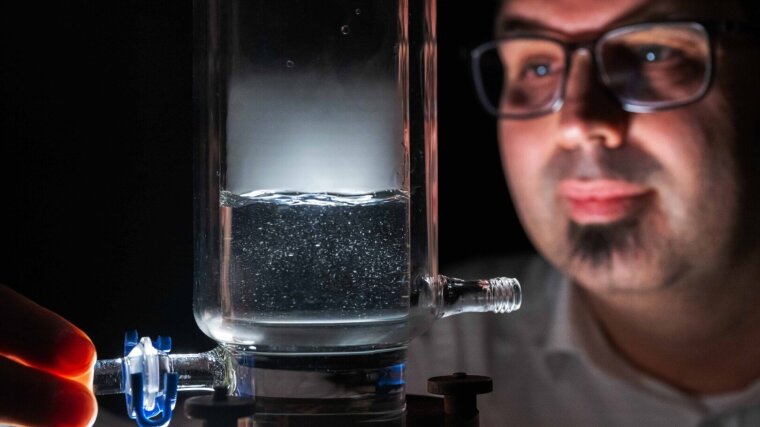
- Knowledge Transfer and Innovation
- Research
Published: | By: Axel Burchardt
The innovative projects that Friedrich Schiller University Jena is presenting at the Hannover Messe from 22 to 26 April have one thing in common: they are intended to help shape a healthier, more climate- and resource-friendly world. The exhibits can be seen in Hanover at stand C24 "Forschung für die Zukunft" ("Research for the future") in Hall 2External link.
Conserving water
Ensuring that we will still have drinkable and usable water in the future is one of the most important tasks – alongside securing food and plant production and the supply of energy – if we are to have a viable world in the future. The Thuringian Water Innovation Cluster (ThWIC), initiated by the Friedrich Schiller University Jena together with the Fraunhofer Institute for Ceramic Technologies and Systems IKTS and the Ernst Abbe University of Applied Sciences Jena, develops solutions for the sustainable use of water. ThWIC, which now comprises 28 university and non-university research institutions, companies and associations, combines cutting-edge research on central aspects of water use: novel analysis technologies and purification processes, data science innovations and sociological research.
The cluster's innovations on show at the trade fair include a sensor that enables water quality to be analysed in real time without the use of toxic chemicals; new membrane technologies that reliably remove pollutants from water; an interactive educational experience for the water industry and key figure-based forms of assessing water consumption.
Building new batteries with paper waste or polymers
Another project at the University of Jena demonstrates how targeted chemical functionalization can be used to save valuable resources in battery production and catalysis, among other things. In Hanover, for example, researchers will show how lignin, a natural component of plant cell walls and a waste product of the paper industry, can be used as a source of carbon materials.
Another approach to the battery of the future is the development of "organic batteries". The active materials used for this consist of organic compounds (polymers), which can potentially replace scarce inorganic electrode materials (e.g. lithium cobalt oxide). The resulting increased environmental compatibility, simpler processing methods and mechanical flexibility lead to a wide range of applications for organic batteries – from container-sized storage systems for solar and wind farms to small, flexible batteries for smart clothing or packaging. This year, the presentation is being organized for the first time in cooperation with the newly founded Helmholtz Institute for Polymers in Energy Applications (HIPOLE JenaExternal link).
Replacing plastics with modified natural materials
The new start-up project "in|stead", which the University of Jena is introducing in Hanover, is developing sustainable water-repellent surface coatings that do not require any plastics or toxic chemicals. The project aims, among other things, to use natural materials in completely new applications, make plastics superfluous in many areas, replace fossil raw materials and reduce the release of microplastics into the environment as well as carbon dioxide emissions – in short, to actively protect the environment.
In addition, another Jena exhibit shows how carbon dioxide already emitted can be absorbed from the atmosphere and converted into value-adding molecules. This measure to reduce global warming is demonstrated using composite materials consisting of a porous carbon and a polymer with a high affinity for CO2.
International Startup Campus
Friedrich Schiller University Jena and its partners from central Germany support spin-offs and start-ups – on an international scale – to ensure that innovative ideas end up in the real world instead of sitting on a shelf. The "International Startup CampusExternal link " of the universities of Jena, Leipzig and Halle-Wittenberg provides advisory services and sensitizes start-ups to growth opportunities and the consideration of international markets in the development of business models at an early stage. The "International Startup Campus" has already supported numerous start-up projects and start-ups in their internationalization and at the same time addresses international start-ups and companies as cooperation partners at the trade fair.